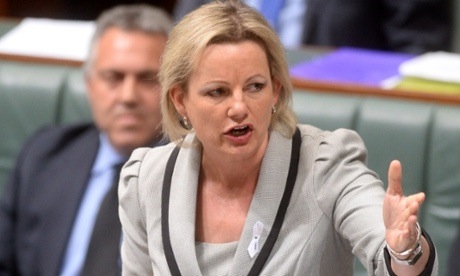
Another month, another health minister, another reboot of the discredited GP tax, but the same old false arguments.
Health minister Sussan Ley is sticking like a barnacle to the hull of the discredited and dishonest justification for the GP tax advanced by her failed predecessor, who took one year in the job to be declared Australia’s worst health minister for 40 years.
In her first public appearance this week she repeated Peter Dutton’s claims that because Medicare cost more today than it did 10 years ago, this was proof growth in health funding was “unsustainable”.
Despite Ley being unable to produce any data to support her GP tax arguments on RN’s Breakfast program this morning, there is plenty of data out there. It just says the opposite. Three expert reports from impeccable sources have proved in recent months that the argument health spending is “unsustainable” is garbage.
Diagnosis 1 came in September from the government’s own Australian Institute of Health and Welfare which revealed in its Health Expenditure Australia 2012–13 report that health expenditure is actually growing at its lowest level since it began keeping records 30 years ago.
The report found total spending on health goods and services in Australia was just 1.5% higher for the year. When population growth is taken into account, average annual health spending of $6,430 per person was actually down in real terms.
And that is total health spending. The Commonwealth’s health spending in 2012-13 actually fell by 2.4% in real terms.
Diagnosis 2 came in October from the world’s most respected economic body, in the latest OECD comparisons of health spending across the developed world.
This was a double whammy for the minister, with:
- Australia’s health outcomes are significantly better than the OECD average.
- Australia’s health spending (as a percentage of GDP) is lower than the OECD average.
According to the OECD, health spending in Australia in 2011 (the most recent year for comparisons) was 9.1% of GDP, below the average of developed nations of 9.3% and just over half the 16.3% the USA spends not keeping a large percentage of its population healthy.
It’s the same story for public health expenditure. Just 6.2% of GDP for Australia, compared to an OECD average of 6.7% and a record 10.1% by the Netherlands. Spain, Italy, the USA, even New Zealand, all spend more than Australia with little evidence of better outcomes, and in many cases, far worse.
In return for that modest outlay (by international standards), Australian women can now expect to live to 84, and men 79.9 – around two years better than the OECD average for both, and close to the best in the world.
And we get this outcome with a universal health system that guarantees all Australians access to a GP or public hospital regardless of their capacity to pay.
Diagnosis 3 was November’s Bettering the Evaluation and Care of Health (Beach) report which exposed the stupidity of the stated aim of the GP tax to cut GP visits by 1 million consultations a year.
The report found Labor reforms to reward longer consultations are working, with GPs spending more time with their patients, and diagnosing an increasingly complex series of health issues.
The average consultation time is now 14.4 minutes, almost a minute longer than just three years earlier.
The authors of the report are clear that spending on GP services is a sound investment that is reducing pressure on the health budget. In an opinion piece for The Conversation entitled Medicare spending is value for money, the authors declare:
As GP services are far cheaper than other types of medical services, discouraging GP visits by introducing a standard co-payment for most patients would increase costs to governments, now and later.
In other words, as Labor and most health experts and professionals have been telling the government since day one, cutting frontline GP services is a false saving that costs the health budget much, much more in the longer term.
So, three expert opinions, from three very different, but highly credible and independent sources all reach the same conclusion: Australia has one of the world’s most efficient and effective health systems, with no evidence that spending is unsustainable.
It’s proof that when a government is committed to Medicare it is possible to deliver an affordable and sustainable health system without making pensioners and families pay a tax every time they need a doctor.
It’s also proof that the entire rationale for the GP tax is nothing more than an ideological attempt to gut health and wreck Medicare.
The evidence is in and the figures do not lie. Medicare can continue as a strong, affordable universal health care system and it is perfectly possible to ensure that health spending is sustainable without punishing people with a GP tax version 1, 2 or 3.
